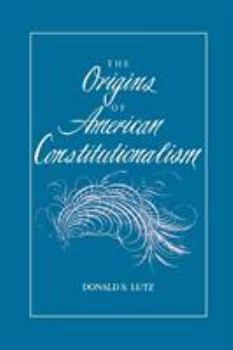The Origins of American Constitutionalism
Select Format
Select Condition 
Book Overview
In The Origins of American Constitutionalism, Donald S. Lutz challenges the prevailing notion that the United States Constitution was either essentially inherited from the British or simply invented by the Federalists in the summer of 1787. His political theory of constitutionalism acknowledges the contributions of the British and the Federalists. Lutz also asserts, however, that the U.S. Constitution derives in form and content from a tradition...
Format:Paperback
Language:English
ISBN:0807115061
ISBN13:9780807115060
Release Date:October 1988
Publisher:LSU Press
Length:192 Pages
Weight:0.05 lbs.
Dimensions:0.5" x 6.0" x 9.0"
Related Subjects
Americas Civil Procedure Education & Reference History Law Rules & Procedures TextbooksCustomer Reviews
2 ratings
the long way to the U.S. constitution
Published by Thriftbooks.com User , 15 years ago
The first chapter was very boring to me, because the author just gets into a lengthy definition of words. But then he goes into the governmental history of the colonies and shares great details: on how the colonies came from single little towns to "counties" and to states through charters, covenants, compacts all the way to state constitutions; what and what not they used from British laws and how they viewed and contracted themselves in relations to England and the crown. It is a very thought out and intellectually written history documentation.
One of the most important recent histories of the U.S. Constitution
Published by Thriftbooks.com User , 16 years ago
In recent years, writers like Michael Zuckert have propounded a solution to the republican/liberalism debate by suggesting that liberalism is the core political philosophy to which the civic republican political science was adapted. Lutz' magnificent and pithy volume (about 170 pages of text)suggests that Zuckert and others may have it all wrong. That it was in fact the American colonial experience that generated a core political theory to which was adapted Lockean political philosophy, the common law tradition and Whig political science. In Lutz' telling, the American constitutional tradition started with the charters and convenants that founded the earliest American colonies. Lutz carefullly delineates between a compact, a convenant and a constitution. Both compacts and convenants were agreements "creating something that we would today recognize as a community" (p.17). The difference between the two was that the convenant was witnessed by the highest authority; either secular (King) or religious (God). The original colonial charters granted the colonists the right to institute governments to govern themselves both politically and religiously. One of the ironies of Lutz' story is that the first step from a convenant toward a founding compact (one that was witnessed by neither King nor God) came in a community (Providence, RI) "so religious that taking oaths was regarded as tantamount to taking God's name in vain"(p.28). The implication of this was that the Providence Agreement was based on the authority of the signers themselves. Thus, Lutz argues that on August 20, 1637 (decades before any of Locke's works)the American tradition of popular sovereignity started. Lutz examines many of the subsequent founding documents, e.g., Fundamental Orders of Connecticut, the Massachusetts Body of Liberties to see how the fundamental tenets and assumptions of what he has called American theory of popular control developed (this theory is summarized on pp 94-95). Along the way, Lutz makes his argument that it was this developing body of American theory and experience that determined which aspect of various European intellectual or legal traditions were adapted by the colonists. From that point, Lutz then examines how that tradition evolved in the first state constitutions, the Declaration of Independence, the Articles of Confederation and then the Constitution. His examination of these documents is full of insights. He feels that the dual citizenship formalized in the Constitution was implied in parts of the Declaration ("the thirteen united States of America" "it becomes necessary for one people to dissolve the political bands")(p.116) Another lesson was to take the judiciary away from the control of the legislature as it was in the early state constitutions. The U.S. constitution created the judiciary as a seperate branch for the first time, an innovation that later state constitutions followed(p.109). This independence of the judiciary is one of the ways th




